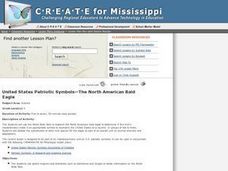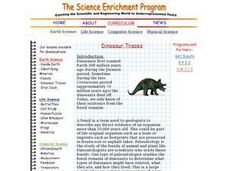Curated OER
Ancient Creature of the Deep
Learners compare and contrast the coelacanth, a living fossil, with a moray eel and a bull shark. They complete a Fish Anatomy worksheet while researching the skeleton, body coverings and buoyancy of each fish.
Curated OER
Mustang: Wild Spirit of the West
Learners write a day in the life story from the point of view of another endangered animal. Students write to your local newspaper to express their opinions on the issue. Learners research a horse's diet and explain why horses have...
Curated OER
Arabian Camel or Dromedary
In this camel worksheet, students study the diagram for an Arabian camel otherwise known as a dromedary. Students read the characteristics of the animal and may click on associated links to learn more.
DiscoverE
A Leg to Stand On
Give your learners a leg up in their study of engineering. Groups design and create a prothestic for a leg. They test out their designs for strength, stability, durability, and comfort.
Curated OER
Species Diversity in Ecosystems with Different Techniques of Land Management
Students visit numerous places to help in their understanding of Ecology. In this biology lesson plan, students will learn about characteristics and how to identify numerous plants and animals. This lesson allows for many field trip...
Curated OER
Fossil Kit I - Lesson Plan
Here is a 14-page lesson plan that deftly outlines a wonderful educational experience for your youngsters. In it, students learn about a variety of animals that have left behind clues of their existence in fossil form. Many excellent...
Curated OER
Build a Coral Polyp
Students build a coral polyp out of a banana, straw, oyster crackers, sprinkles, and more. In this coral polyp lesson plan, students also list the differences between plants and animals.
Curated OER
Fossil Kit II
Youngsters examine four fossil replicas and chart their time periods, vertebrate or invertebrate, and the names of other organisms living at the same time. A specific fossil kit is available for sale if you do not have the same samples....
Curated OER
Reading Comprehension
What reading strategies improve comprehension? Give your class a few strategies to try while they read this short passage on education and science. Then, have them complete the multiple choice questions that follow. The answers are...
California Academy of Science
Fish Forms
I've said it before, and I'll say it again, you can add art to any lesson! While little learners are discovering why fish have specific body parts such as, scales, fins, and gills, they start making three-dimensional fish forms. Children...
Howard Hughes Medical Institute
Winogradsky Columns: Microbial Ecology in the Classroom
Winogradsky columns are ideal for observing the role of bacteria and other microorganisms in an ecosystem. This student activity guide is complete with data tables for observations and analysis questions for processing what was observed....
Curated OER
Bioethics
Students are introduced to the issues surrounding bioethics and begin to discover how some of these values can influence decision making. The exciting part of this lesson is the constructivist method used to engage students of all...
Curated OER
Hand Writing: Three Letter Words
In this printing practice worksheet, students trace, form, and print three letter words. Students practice printing ten separate words.
Curated OER
US Patriotic Symbols: The North American Bald Eagle
Young scholars research the North American bald eagle to determine if this bird's characteristics make it an appropriate symbol to represent the United States as a country. They debate the substitution of other bird species for the eagle.
Curated OER
Arthropod Coloring
In this arthropod instructional activity, students compare and contrast the different animals found in the Phylum Arthropoda: insects, arachnids, and crustaceans. Students complete 8 fill in the blank statements and color illustrations.
Curated OER
Vertebrate Dioramas
Students are able to describe the development of their chosen form of vertebrate life from the past to the present in a four to six page typed paper. They explain the use of phylogenetic tree. Students use the phylogenetic tree to...
Curated OER
Vertebrate Dioramas
Young scholars describe the development of their chosen form of vertebrate life from the past to the present in a four to six page paper. They explain the use of a phylogenetic tree, and use this to exemplify an organism's evolutionary...
Curated OER
Cloudy With a Chance of Meatballs
Fourth graders participate in a play to work on seeing events from a different perspective. Some of them are reporters, some cameramen and women, and others are interviewed. They put themselves in the shoes of the people in the book...
Curated OER
Beef (Advanced)
In this beef worksheet, students participate in a variety of activities including completing a digestion dilemma, identifying best meat cuts and selecting a service project to complete.
Curated OER
Sea Horse Body Parts
Students complete a diagram of sea horse body parts. In this sea horse lesson, students review the story Sea Horses A True Book, complete a sea horse diagram using Internet sights to help, make new entries in their KWL charts and work...
Curated OER
Learning in Cockroaches
Students make scientific observations. In this stimulus response instructional activity, students make observations and collect data to determine if cockroaches can learn. A secondary purpose of this instructional activity is to provide...
Curated OER
Dinosaur Traces
Students identify and interpret the type of evidence found at a typical dinosaur dig and mimic a paleontologist by taking crayon rubbings of simulated bone impressions. After the rubbings are taken, the students reconstruct the complete...
Curated OER
Dissecting Owl Pellets
Students explore owl pellets. In this animal science lesson, students use owl pellet dissection kits to dissect one owl pellet. Students use a magnifying glass to identify the foods that the owl ate.
Curated OER
Mammal Morphology - Bats, People, and Other
In this physical characteristics learning exercise, students compare bats and humans by putting a + sign in the chart for whether or not bats and humans have the same characteristics. Students do this for 17 characteristics and answer 3...

























